- Home
- Adam Thorpe
Hodd Page 4
Hodd Read online
Page 4
A page severely stained to the point of illegibility. It appears that the author has been inspired to take the apprentice glazier’s offer seriously, in order to retrieve his musical instrument from the outlaw’s camp.
… The weak morning sunlight had already vanished, like all vain hopes in this fallen world, including those of rich men whose garments furred with vair are eaten by moths as their cadavers are chewed by the worm, when we set out on two nags, myself mounted behind Rycchet on a threadbare pack saddle, as eager as a gallant knight.
We rode in the company of some teachers from Cambryge with doctors’ hoods;31 a thin leech [medicus] who carried a leathern bag in which he kept dried nettles and powder of myrrh (for female maladies that he described to us with much lechery); a stout yet sick-looking friar who snorted with a rheum, though wearing no socks and shod only in sandals;32 a buffoon with a broken fiddle on his back who rode a one-eared donkey; and a very fat goodwife sitting sideways upon a broad-flanked sumpter carrying fish that smelt evilly.
My master had received permission from the abbot that I should depart for four days, even knowing that my enterprise was exceedingly dangerous. But my life to them was no more than a bundle of straw, for my master cared more for the hundred pounds and his reputation than myself. He said that if I spied his light-grey palfrey in the outlaw’s wood, I should snatch it and escape upon it. And that if I should be caught and murther be done and my body left for carrion, then he and the brothers would pray for me many days following, that my soul rise heavenward on their breath from this corrupted earth.
He seemed distracted, and scarce looked at me, only caressing the new down upon my chin outside the infirmary (whence I was carrying a bowl of water for a dying brother of great age, though twenty years less than mine own is now), while saying that the smell of my skin had the flavour of pond-fish, smirking at this because I was no longer smooth and effeminate [vulsus], as was the aforementioned Henrie, the newest of the aforesaid oblates. This Hen[r]i had a great skill in singing that surpassed his tender years (these being eight or nine), and was the son of a merchant of Taddcaister.33 This merchant, ill from grieving of his late and beautiful wife, had taken to tavern-haunting like the lowest sort, and thus his family gave his youngest son to the monastery that God might look more mercifully upon the father. My master appeared to revere Henrie for his sweet voice and angelic countenance, yet I saw beneath to one who was spoilt fruit before he was ripe.
Alack, that I should have succumbed to the serpent of jealousy, and not crushed it underfoot with prayer, when it was ever a small worm!
One day (let me relate), I had come from the kitchens with a pitcher of wine for the infirmary, and crossing the cloister had seen the oblates gathered in a corner by the closed end, for it was blowing cold through the arches; and Henry (not knowing of my kindness to them with cakes and suchlike) sent a stone craftily flying that caught me upon the ear, and turning round with a cry, I spilt the wine upon the flags – spying the catapult in Henrie’s hand before it was hid again inside his robes.
The master of the boys noticed nothing: I believed then that this boy was an angel only in appearance, as fair ladies are often no more than subtleties of needlework and plaited tresses. And on hearing him singing and chanting in the Vespers, I was again ravished not by the Lord’s mercy but by the venomous worm of jealousy.
The Devil oft appears in the guise of the Blessed Virgin in her finest cloak, or counterfeited as a lewd bawd with painted face, that he might tempt men to sin with him; or e’en as a pink-cheeked cherub! And thus I thought of Henri, so much so that anger and suspicion clotted inside me, and the very next week I spat a pellet through a hollow pipe so that it struck him on the nose in the garden, when the oblates were walking there and reading their prayers.
Stopping, he held his hand to his nose with a sharp cry, and red blood ran, not black – yet was I so heartily a-feared of the Devil’s powers, that I well nigh tumbled from the wall from where I had aimed. I was not descried, however, and the master of the boys gave that poor, doomed imp a great clout for breaking the silence.
3
For my foolhardy expedition to the camp, my master [had] offered me a black hooded cloak [amiculum] worn by him before he became a brother, that I might creep up to the outlaws at night, as well as a little ampulla of lead, containing holy water from the shrine of St Cuthbert in North[umber]land, to shield me from harm, which I placed in the purse upon my belt. Thus he still cared for me as a father for his son, though unneth showing any grief or worry, saying I was no longer a child.
Though indeed no longer a child in [terms of ] age, and having long put away any toys,34 yet I was still too young and foolish-brained to think of the danger; or rather, I could not think that the danger of the enterprise might prove mortal and swallow me entire, for I also had an undoubting faith in the guidance and shield of Almighty Christ Jesus and the heavenly divine, that down through all its heavenly hierarchies was concentrated, like a beam of sunlight, upon my modest head of fourteen or fifteen years.
One Wiliem, a wielder of rake and hoe on the abbey farm, parted from his right ear by the action of a bailiff’s blunt saw for cutting a rich man’s purse, and cast from that town [of Nottingham?] – until the true culprit was caught by chance later with the said purse – was an outlaw for a month with the band [of Robert Hod], and furnished me privately with information, for he hated them every one. He said they were cut-throats and villainous and put him in a deep pit for refusing to slay a merchant on the road. He informed me that the felons had their camp on a wooded hill not three miles from the glassworks, with high rocks where one or two men stood on watch. The rough country thereabouts having been laid waste in our great-great-grandfathers’ time,35 the camp’s sentries could see far. There was a cave in the rocks where the villains kept haunches of venison, man-traps, flitches, plunder and firewood.
He said that the wood was small and dark, yet broad enough for a man to stand in the middle and not see the light from the edge, but you could reach the edge in the tenth part of an hour.36 Quoth he: ‘’Tis no higher than a pastie to look at, but fathoms deep if you fall into it:’ following this with a lecherous remark that I privily asked God to forgive, though in my shamefaced colour was read my discomfort, and Williem laughed the more heartily to see it; for his mind was ever on women, and his spleen and liver close conjoined.37
The weather was dry and calm at our departure, although cold enough that we oft rubbed our noses, while certain of the puddles were still fast with ice. Many were the carts that came creaking towards us, their drivers hailing us, sometimes with unseemly words if they were tipsy, that the teachers from Cambrygge answered most wittily. After a while our party ceased talking, and we were soon startled by a flock of crows making a pestilent noise above our heads, that did drown out the clatter of our mounts upon the firm way. There being no thieves’ gibbet full with carrions at that spot, nor a crossways where suicides or hanged criminals be too lightly buried, it seemed we ourselves must be the miscreants. Yet I heeded not the warning!
The friar muttered prayers until this ill omen was gone; but I was affrighted suddenly, and even the soft wind blowing either side to the far horizon methought full of dread whisperings, until Rycherd before me on the saddle began to sing.
A short distance before the wilder heath, and none of us having breakfasted, we stopped at an alehouse with a bush placed so low that the buffoon plucked a sprig from it.38 The teachers from Cambrydge quipped and jested, oft breaking into Latin that I craved to understand fully, for my progress in the aforesaid tongue had been slowed by the imperfect grasp of my master, brother Thomas, following the excellence of my first and most learned teacher in his humble sea-cave. The goodwife was so coarse of word and ill-smelling with sweat corrupted by her scaled and glimy produce, that she was expelled from the room by the alehouse-keeper, her distended limbs being not those of a female’s but each like the trunk of a pig; though she protested exceedingly, we were s
carce in agreement with her.
The teachers playing dice like any group of fools, they bid me join them, because they knew from the apprentice Richerd that I was a minstrel, but I denied this, saying I was a monk’s page and performed only for his pleasure, and that dice were the makers of poverty. And they said that I was indeed no minstrel if I did not play dice, and I felt aggrieved. Meanwhile, the leech continued to regale us with his unclean tales, for his fingers had touched uncounted women in every place on their flesh; being forbidden to play with us for this very reason, he sat apart and filled the room with his words, as if breaking wind from his mouth.
We ate there before the fire, but the food was greasy and thin. The buffoon sought redress, saying, ‘You have baked garbage in these pasties, very like rabbit, and not hen, and it is a stinking pottage.’ We agreed that it smelt, and was more like rabbit than pullet, but the alehouse-keeper called out the cook to show us his pullets and woodcocks and teal. Then the buffoon was joined by the fellows from Cambrygge, for there was no doubt the pasties were stinking, though the keeper said it was the air of the goodwife remaining like a vapour. Methought rather it was the leech’s unclean tales that had contaminated the food, as father Gerald had described in a sermon not long before, when he talked of vile gossips, and I secretly called on God and His Spotless Son to remedy the pasties, but the corruption remained.
Then the culprit39 stopped up his left nostril with his finger, saying that it was the side that inhaled air and must be closed lest his brain turn into a fish. And the assembled party struck the tables with its fists, roaring merrily so that our ears were near to bursting after the quiet of the journey; and lifting the jub of ale, one scholar claimed its emptied contents were also sour, for it had been brewed not from malt but the wits of a clerk of Oxenforde – and other tiresome jests that such learned minds do love. A fight ensued in which one of the scholars was struck upon the head by a bag full of parsnips and fell insensible as if dead, and the quack doctor’s bag was cut open by a cooking knife and his myrrh-and-nettle powder did dust the whole room to his great grief, though to my mind the myrrh was only ground brick – for there was no fragrance in it, save that of cinnamon.
Yet no one dared set a finger upon the leech, not even to pull his goat’s beard, for he had handled women on every part and even beneath in the secret places where the stink and scorch of Hell-mouth lies. And he had boasted that no matter how much the patient weepeth and howleth, he must cut and burn the rotted part, or grope among the entrails for the sickness, e’en on the opposite side to the pain; and this he had done many times, he said, showing us his long fingers with their filthy nails, so we felt afeared of suffering and sickness and death; although (unbeknownst to us) it was to him that lean and hooded Death was already crooking a finger!
The master glass-maker and his apprentice had slipped away [aufugerunt]; I ran out from the melee to join them on their slow nags, protesting that they had abandoned me, at which they snorted;40 and the goodwife also [snorted] with them, saying it was no wonder, for I had less flesh on me than a heysoge.41
We left the highway and took a little way over the heath without the goodwife, leaving her stench and coarse talk to the [main] route north; our humble track having broad views either side, we feared robbery less, and after two hours reached the glassworks, that stood some three miles short of the spot where the waste of bracken was, which in turn was no more than a mile and a half from the enemy position.
The glassworks had watchmen posted, numbering some ten men armed with pikes; around it spread a vast stretch of land owned by our monastic house, which included even the robbers’ wood. All the glass of our abbey church had been made within this simple structure for some thirty years: it being a large tile-roofed building puddled over in clay, standing below the edge of a wood, whose oaken trees lay darkly beyond. A monstrous heap of felled and hewn timbers were spread nearby, recalling to me the pale corpses piled up by Hell’s mouth, waiting for the furnace, painted on the walls of our chancel. And truly, it was indeed like Satan’s kingdom, with incessant dark smoke billowing through and smarting my eyes as mustard doth.42 The oak wood was pollarded [amputatus], giving a dismal air, and before us lay a huge trench full of clean river-sand, stirred by men with long spades.
Richerd told me that the men with spades were mixing the ashes [of fern and oakwood] into the sand, this mixture being then carried in great pans to the building, within which stood something like a monstrous beehive, that was really a set of ovens glowing with a heat and light I had never witnessed before; and I was aghast at the sight. Cast into the oven, the mixture43 cooked for a day and a night. The oven’s raging was fed constantly by a man whose horrible grimace was like a Turk’s, for his skin was dark with soot and blistered all over. ‘Each unnumbered grain of sand is truly a soul,’ I said, ‘and we might hear them screaming together as they do in Hell.’ But Richard only laughed, for he was jovial of temperament and his love of God had waxed cool.
I felt faint with the heat and the clamour, and hardly listened as Rycherd shouted and joked with the men, so that sometimes they sounded like the fiends that cackle and hiss over the unhappy wretches continually consumed and tormented e’en as I write – the same wretches still, and merely added to, tipped out from the monstrous pans that scoop them from the mercy of the Lord, for these torments are for eternity, countless leagues from the majesty divine of Christ Jesus …
Here follows a page of dismal reflections irrelevant to the main theme, and which I have unapologetically lopped.
… The worst fires, however, were to come, for upon the far side of the beehive structure, half-stripped men placed clay crucibles in a covered furnace within it, whose unearthly light might have blinded the basilisk. These crucibles held the aforesaid mixture; the unceasing, extreme temperatures of the furnace, that glowed horribly around the edges of the oven door, and belched forth a most reeking heat when opened, melted that mixture to a pliant liquor. The glaziers then let their breaths blast into this liquid, that glowed like a monstrous firefly, thereafter swelling it to a bubble and spinning it about until it flattened; whereupon I saw, as in a miracle, the flatness of a window’s glass.
There, on trays against the wall, lay the glass that had cooled, in hues of green and blue and yellow, that would soon be gracing our chancel and the churches of other houses of the Order. I thought of these pieces colouring the winter light and the summer light of days unnumbered; or the moonlight that sometimes fell upon the brothers between the sparse candle-glow during Matins, Lauds and Prime. I also pictured these shapes of glass with the fresh glory of spring light upon their smoothness, or feeling the spatter of autumn rain or the soft showers of April, or being rubbed by the warm shoulder of the sun at harvest time – and e’en smitten by the violence of hail that would trouble the brothers’ chanting, yet lie about the garden like jewels.
I felt my soul lift in humble rejoicing at this miracle, that had been torn from the very furnace of the abyss, just as I should tear my treasure from the felons’ camp, and perhaps from the very hands of Satan himself: who was otherwise named Robett Hod.
I slept in the place where the other glassworkers lay, while the fire in the ovens burned all night, casting a glow over the adjoining woods and up unto the heavens. Forthwith at dawn, Ricchet and I set out on foot with mules for the bracken, carrying well-whetted knives. We crossed several miles44 of wild, heathy country before we arrived at the spot, which was a gentle rise cloaked in dried fern, as though mantled in copper, wherein sheep oft love to rest with their lambs; there we set to [cutting], crawling as flies do upon a great rug. Richet told me that I must not mount the crest, for there were always the felons’ eyes upon it.
He said that e’en now they might be watching us from an unexpected quarter, and I looked about me in some fear, seeing only the brackeny slopes spreading afar, naked of habitation, and swept over by many a peeping plovver45 and other chattering fowl, including the haughty hawk who might have taken us
for a pair of mice, so high did he soar. And wherever there was a clump of bush or a twisted tree, I imagined a felon’s face fixed upon us with beady eye: and my flesh tingled as if with ants, imagining an iron point pricking it at any moment.
Our agreed plan [ratio rei compositae] was to tether the mules and to spend the night in that spot, covering ourselves in the bracken for warmth, as was customary [for the fern-cutters]. Soon after I must set off for the wood in my borrowed cloak, to enter it only when the night has ebbed but the light not yet grown beyond a greenness to the east. First, however, I must see where I was to go in the darkness. My impatience knew no bounds. I worked harder on the bracken with my knife until I had left Rycherd behind, and soon arrived at the crest, from where I engaged my sight furtively to the south, cutting all the while.
Upon a low hill at the furthest horizon lay a menacing form that was the wood, its darkness falsely clad in autumn gold, with a lumpen shape of rock at one end, that was the hill’s peak; the ground sloped away from there full bare and gently curved, smooth as a maiden’s limbs, that made any approach as hard as if it was the den of the cockatrice, which slays with its sight alone.
That night we bedded down under our heaps of bracken, and yet I shivered. Our labour had made us weary and Riccherd, after wishing me the courage of the weasel, for only the weasel might slay the cockatrice, soon fell into slumber. Indeed, he himself showed little sign of courage, for he had said again that he would not accompany me to the hideous wood were I to offer him good silver, and then made much jest with a false penny, pretending he was a priest and that this coin was my howsel, to absolve me of all sins, putting it into my mouth like the holy bread.
The night sky was clear, for there was a northerly wind. Ricchet snored, and his large feet against my skin were cold as frost – that I e’en feel now, as I shiver on this bench in our seaward cloister, where the cold gnaws at my toes as I scratch these very words.

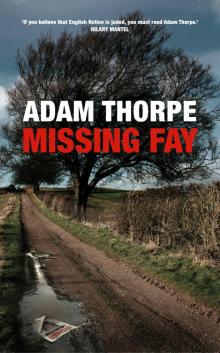 Missing Fay
Missing Fay Hodd
Hodd Pieces of Light
Pieces of Light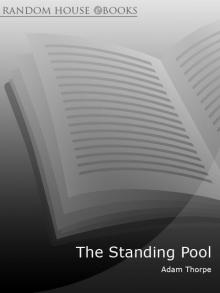 The Standing Pool
The Standing Pool Ulverton
Ulverton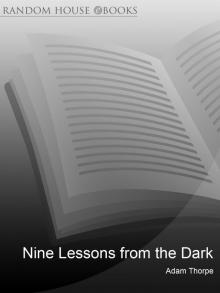 Nine Lessons From the Dark
Nine Lessons From the Dark Flight
Flight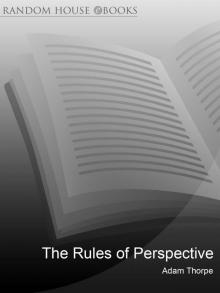 The Rules of Perspective
The Rules of Perspective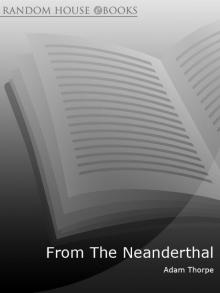 From the Neanderthal
From the Neanderthal Is This the Way You Said?
Is This the Way You Said?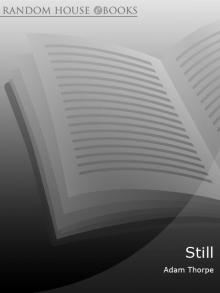 Still
Still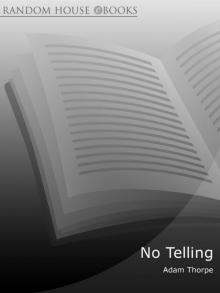 No Telling
No Telling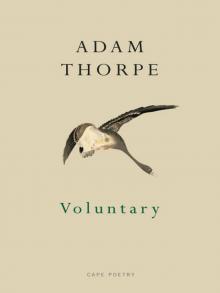 Voluntary
Voluntary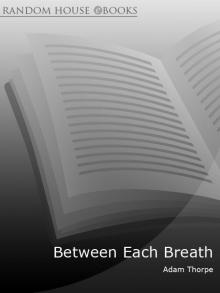 Between Each Breath
Between Each Breath